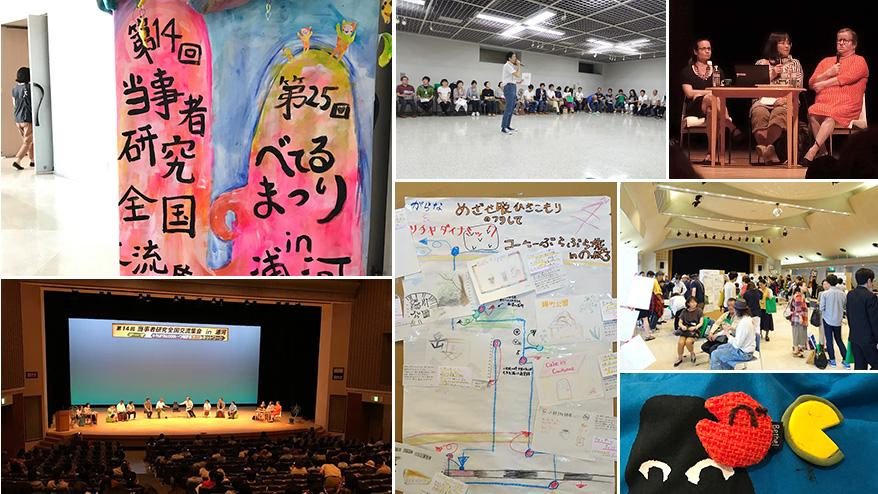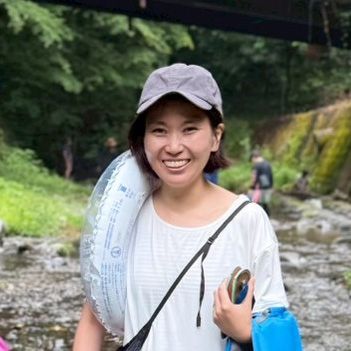ものさす編集部の中庭です。
今年7月末に開催された “べてるまつり” と当事者研究集会のレポートを、前後編でお伝えしています。
前編ではべてるまつり2017のレポートをお伝えしました。今日はその後編で、べてるまつり前日におこなわれた当事者研究全国交流集会(以下、当事者研究集会)について、とくに午前の部のシンポジウムのテーマ「オープンダイアローグ」をメインにお伝えします。
(べてるの家&べてるまつりとは?という方はこちらからご覧ください)
オープンダイアローグの発祥の地、
ケロプダス病院ではたらくふたりの話
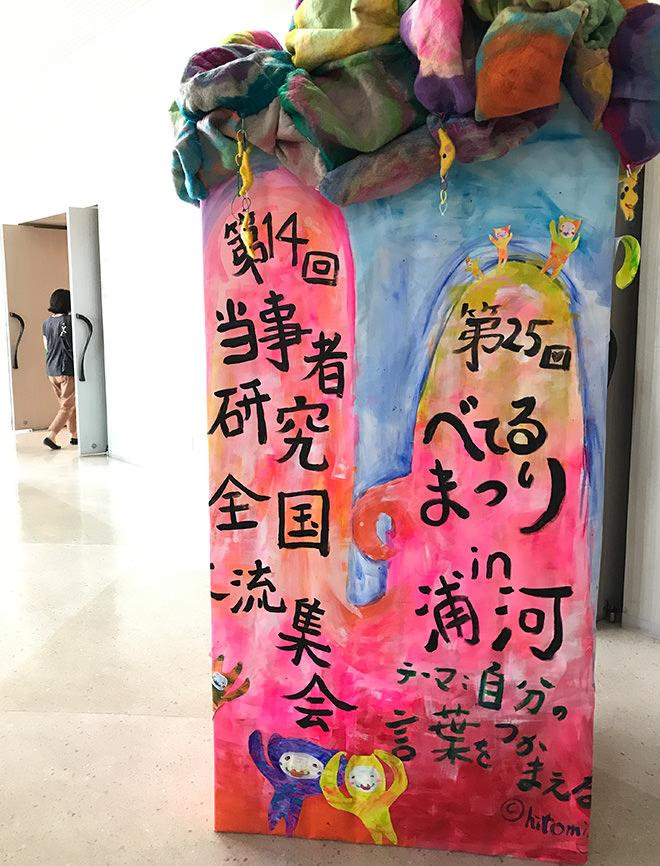
毎年各地で行われている「当事者研究全国交流集会2017」が今年は北海道の浦河町で、べてるまつりの前日の7月28日に催されました。
当事者研究とは、べてるの家でうまれた精神療法のアプローチで、統合失調症などの当事者が、自己病名をつけ症状を分析したり、かかえている様々な生きづらさや固有の経験を研究し、発表することを言います*。
その全国大会が、今年はべてるの家の本拠地、北海道浦河町でおこなわれるということで、べてるまつりとセットで参加することにしました。
*「当事者研究とは-当事者研究の理念と構成- 」当事者研究ネットワーク 2017年8月現時点参照
午前のプログラムはフィンランドのケロプダス病院からやって来た経験専門家のヘレナさんと、心理士のリーッカさんが、それぞれの経験を交えながら「オープンダイアローグ」について話をしてくれました。
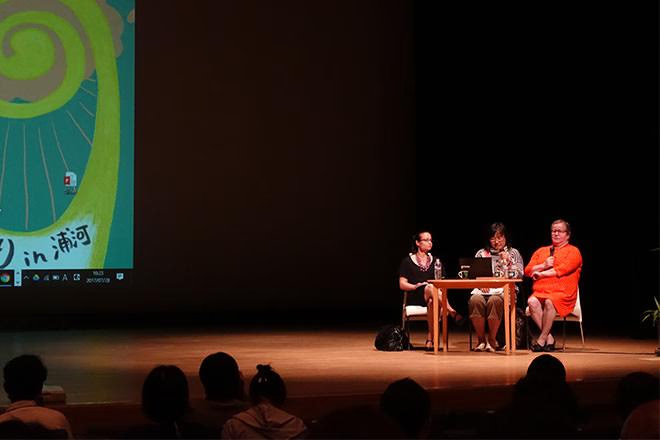
左端に座るのが心理士のリーッカさん、右端が経験専門家のヘレンさん、真ん中はムーミン研究家でフィンランドに長年住んでいる通訳の森下圭子さん
フィンランドのケロプダス病院といえば、「オープンダイアローグ」発祥の地。オープンダイアローグとは対話療法*のひとつで、30年ほど前にはじまりました。現在、精神医療の現場で注目を集めつつある治療法のひとつです。
*急性期精神病における開かれた対話によるアプローチ Open Dialogues Approach in Acute Psychosis
ケロプダス病院がある西ラップランド地方は6つの自治体があり人口6万2千人。人口密度は日本と比べるとかなり少なく、この環境だからこそ実現できたことがあるのではないかとリーッカさんは言います。
この地で「オープンダイアローグ」という治療法をおこなうことで、精神疾患患者の年間の平均診療時間は9日間(フィンランドの全国平均は34日間)になったとのことで、約4分の1ほど(!)に減り、投薬も圧倒的に少ないとのことです(薬が不要な患者がほとんど)。
この「オープンダイアローグ」については次の章でさらに詳しく述べますが、べてるの家がおこなっている「当事者研究」との共通点がいくつもあります。フィンランドと日本の最北の地ではじまったこのふたつの治療法が双子のように似ている感覚をヘレンさんとリーッカさんも持たれたようで、ふたりとも「浦河に来たら、自分の家に帰ってきたような感じ」と話していたのが印象的でした。
オープンダイアローグで大切にしていること
オープンダイアローグで大切にしていることについて、リーッカさんは治療者側の立場で話してくれました。
まずは、助けを「すぐに」得られるようにしているということ。
相談の電話は24時間体制で受け付けており、最初の電話があってから24時間以内に面会(オープンダイアローグ)を行います。
初回の面会の段階で、治療チーム(医者、看護師、心理士など)以外にも、患者に近しい人(主に家族)を集め、できるだけ関係者全員で話をします。
治療がすすむにつれ、クライアントがいま何が必要か変わっていきますが、面会はその都度必要なメンバーを再構成しておこなうそうです。
また、治療のなかで家族が当事者にとっていかに重要か、ということを強調されています。
「問題」と言われているものは、誰かと何らかの関わり合いの中から発生するものだし、良い時間も関係性のなかから生まれる。悪いことや良いこともあるということは、問題も誰かとの関係性で解決するのでは、と。
だからこそ、オープンダイアローグでは、クライアントが話す言葉にその場にいる全員で耳を傾け問題を共有するのだと、リーッカさんは言います。
「問題を言葉にするのは本人にとっては大変なことですが、もともと話すことが難しかったことを言葉にすると、“力となるようなもの” が生まれてきます。家族と一緒に話題にすることで力が湧き上がり、そのあとのいろんなことがスムーズになるのです。
その場に関わった私たちは、一緒に旅をした感覚でいます。」
また、その場に経験専門家(ピアサポーター)が入ると、どういうことが起こっているのかをよりクリアなかたちで、正直にクライアントさん伝えることができるとのこと。聞く側は素直であること、正直であることが大切で、なおかつそれを勇気をもって言葉にすることが重要だと言います。
このようにオープンダイアローグは、クライアント側と治療側、双方の対話で成り立ちます。とくに「きくこと」は「質問すること」より大切で、結論や合意も目指しません*。クライアントの経験がどんなものだったのか、批判や診断はせず、耳を傾ける、そして感じたことを正直に話すことで、クライアントの経験が再構築されるきっかけになります。
*斎藤環 著訳『オープンダイアローグとは何か』2012 医学書院 参照
リーッカさんがもっとも心がけていることは、「クライアント自身が自分自身の専門家であれ」いうことだとだそう。これは当事者研究でもほとんど同じことが言われていますが、治療の主体が医療側にあるのではなく当事者本人にあり、彼らが自分自身の言葉をとりもど
すことの大切さを教えてくれました。
オープンダイアローグをおこなう職場の環境
リーッカさんは自身が働く職場の環境についても話してくれました。
「オープンダイアローグでは、治療者側がひとりということはありません。かならずチームやペアになり、複数の視点を持つことを重要視しています。いろんなセラピストの意見を聞けるということは、自分たちの人生をも豊かにするし、新人のセラピストは学ぶことができる」
さらには、新人は「経験が足りない人」ではなく、「新鮮な視点を持っている人」として迎い入れられるそうです。
また、「弱みをみせられる組織は強い」これはぺてるの家の向谷地さんの言葉ですが、リーッカさんは深く共感していました。彼女の働く職場では、お互いの弱い部分も含めていろんな部分を知っているので、何かつらいことがあった朝も「このままの私で職場に行けばいい」と、職場にいくことがつらくないと言っていました。
当事者だけではなく治療する側のあり方も重要だからこそ、リーッカさんは職場の環境も伝えてくれたのだと思います。彼女の話は精神医療の現場だけの話にとどまらず、自分の職場や家族、コミュニティにもあてはまる話だと思いながら聞いていました。
オープンダイアローグを受け、自分の言葉を取り戻した
経験専門家ヘレナさんの話
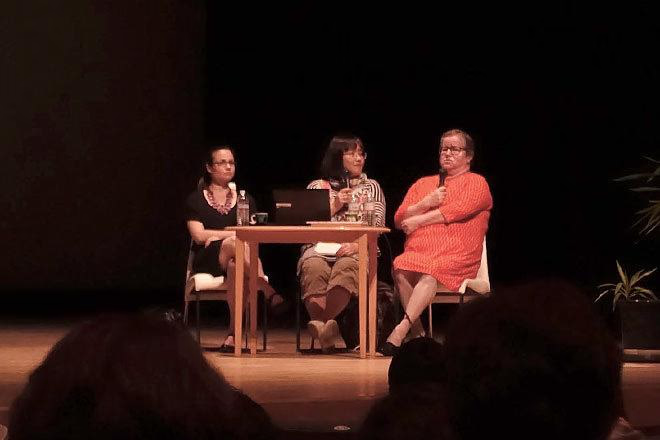
画面中央の右端が経験専門家のヘレナさん
一方、経験専門家として活躍されているヘレナさんは、幼い時に受けたトラウマが原因で重度の鬱になり、ケロプダス病院で治療した経験を語ってくれました。
「わたしの目に映った治療者たちの様子をお話します。まず私を人間として尊重し、私の言葉をきちんと聞いてくれました。そしてみなオープンです。
私は彼らのことをすぐに信用しました。正直に話してくれているということ、私がいないところでは私の話はしていないということ。そうしてくれたことで、私自身、非常に難しかった問題について、自分の言葉で語ることができました。
つまり私自身、正直にならなければいけない。つらいことがあったらそれに目をつぶるのではなく、踏み込まなければならないと思ったのです」
クライアントとしてオープンダイアローグを受けたヘレナさんが感じたことは、リーッカさんの話と呼応するような内容だと感じました。
治療者側の正直でオープンな姿勢がヘレナさんに響いた結果、彼女は自分の体験に向き合うことができ、自分の言葉を取り戻すことができたのです。
こういった治療を経たヘレナさんは、その経験を地元に還元したいという気持ちから、いまでは経験専門家としてケロブタス病院などで活躍されています。
ふたりの話を聞いて、リフレクティング
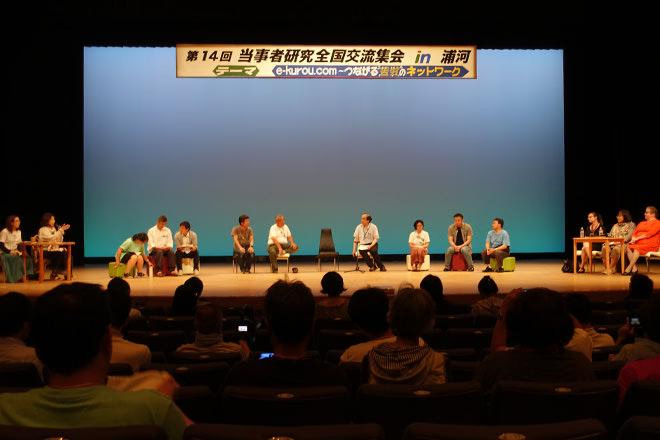
リーッカさん、ヘレンさんの話のあとは、べてるのメンバーと、韓国の精神科医療で働かれているキムさん、ソンさんを加えてリフレクティングがおこなわれました。
オープンダイアローグでいうリフレクティングとは、話し手の話に対し、聞き手同士で感想を述べあうことです。話し手は、今度は聞き手にまわってそれを聞きます。オープンダイアローグではこのリフレクティングを必ずおこないますが、このやりとりを何度か繰り返すことで、経験を言語化していきます。
ふたりの話を聞いたべてるのメンバーは、自分たちの経験になぞらえて、苦労をする力を取り戻して行くこと、弱さを分かち合うことについて話してくれました。
安心して治療を受けられる、安心して働ける場の話題になると、べてるの家が掲げる「安心してサボれる会社づくり」の話や、隣の人と言葉を交わすこと、あたたかい居場所づくりなどの話におよびました。
韓国からいらしたキムさんは、「治療者と患者との関係性について勉強になった。韓国では精神疾患をもった人たちが地域で住むのを危険視されているが、当事者が地域で安心して暮らせるように頑張っていきたい」と言い、ソンさんは、「韓国の治療の現場では支援者が中心なので、当事者中心にしていきたい」などと話してくれました。
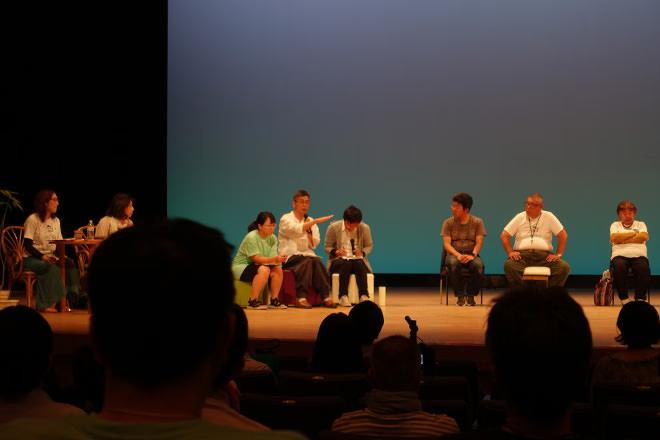
画面真ん中の3名のうち、真ん中でマイクを持つのがキムさん、その左手がソンさん
ポスター発表 & 分科会
お昼を挟んで午後はポスター発表と分科会がおこなわれました。
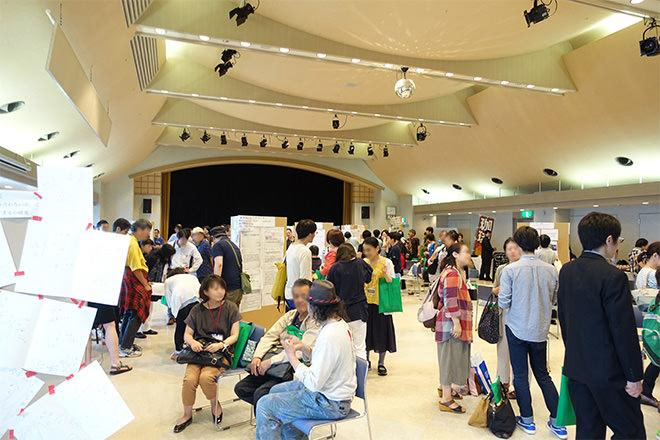
ポスター展示会のようす
ポスター発表では有志の方がそれぞれの研究テーマをポスターにして、展示します。当事者研究のものが多いですが、なかには支援者側の視点の研究もあり、ひとつひとつが固有の視点で、シビアな話ながらユーモアもあり、読んでいてくすっとしてしまうことも。それぞれの苦労の手触り感が感じられます。
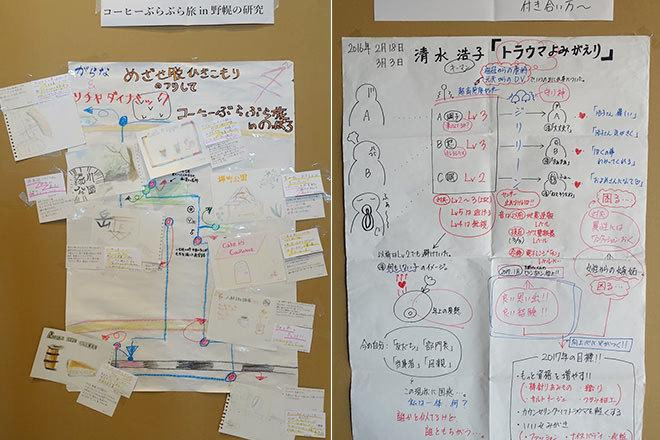
発表は文字だけでなく、イラストなどを加えて楽しく発表してくれています
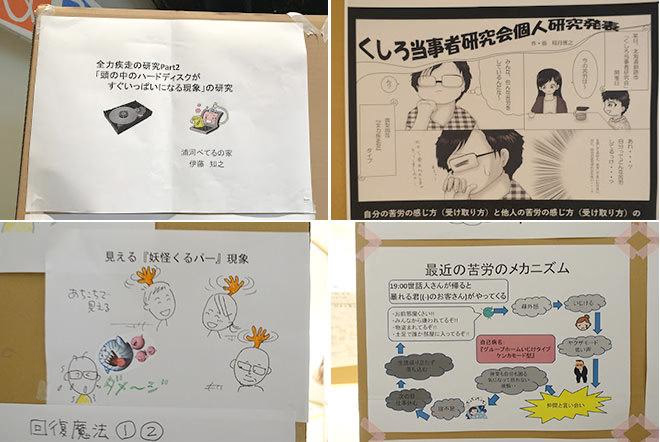
なかには漫画になっている人も。つらいのですが、暗くありません。
そのあとは2時間におよぶ分科会がおこなわれました。プログラムは以下のとおりです。
-
e-kurou LIVE! 駆け込み当事者研究
・当事者研究をライブでおこなう -
じぶんの「専門家」になる
・リーッカさん、ヘレナさんに質問したり、語り合う会 -
SupA(Supporters’ Anonymous)の会
・支援者の当事者研究をする -
ご当地当事者研究
・お国言葉で苦労を語るワークショップ
この中からいずれかのプログラムを選んで参加します。仕組みを直前までわかってなかった私は、前半は1の当事者研究ライブ、後半は3の支援者の当事者研究に参加してみることにしました。(決まりは特になかったものの、大抵の人はひとつのプログラムを最初から最後まで参加されているようでした)
分科会1 e-kurou LIVE! 駆け込み当事者研究
分科会1の当事者研究では、進行役の2人と、5~6名の立候補者が前に出て、ワイワイと当事者研究がはじまりました。みなさんが話す自己病名は、毎回笑いや共感を呼びます。
ホワイトボードに話の内容が書き出されるのですが、ひとつあがったのが「べてる祭りが終わったあとのさみしさ研究」。研究内容は、なんというかいい具合にカオスな状況になっていって、笑いが絶えないあたたかい雰囲気のなか進んでいきます。当事者研究については本で読んではいましたが、実際の現場はこのときはじめて体験することができました。
分科会2 SupA(Supporters’ Anonymous)の会
後半に参加した分科会2の「SupA(スパ)の会」では、支援者自身の当事者研究をおこなう場です。支援者の方の話も、当事者の方とおなじくらい聞いてみたかったので、参加してみました。
その日この分科会の参加者は68名。くじ引きで8つのグループに分かれて、各テーブルでそれぞれの苦労について語り合います。わたしは前半参加できなかったのですが、SupAの会の方から「支援しあう仲間たちへの回復への8つのステップ」が書かれた資料をいただき、途中参加させていただきました。
わたしが参加したテーブルは、医療関係の方、ソーシャルワーカーの方たなどが多かったのですが、みなさんのそれぞれの悩みや疑問は自分にも当てはまることが多く、一緒になって考えました。
最後に全員で円になって、ひとりずつ感想などを話していきます。そこでさまざまな立場の人がこの場に来ていることを知りました。医療関係者やソーシャルワーカーの方はもちろん、当事者の方、当事者の家族の方、弁護士の方(なぜかとても多かったです)、記者の方、よろず相談員、学生の方など。どんな方たちが、どんな思いでこの場にやってきたのか知れたことも、この会に参加してよかったことのひとつです。
分科会のあとは全員集まって「全体会」が開かれ、ポスター展示のふりかえりから、それぞれの分科会で起こったことなど共有しました。
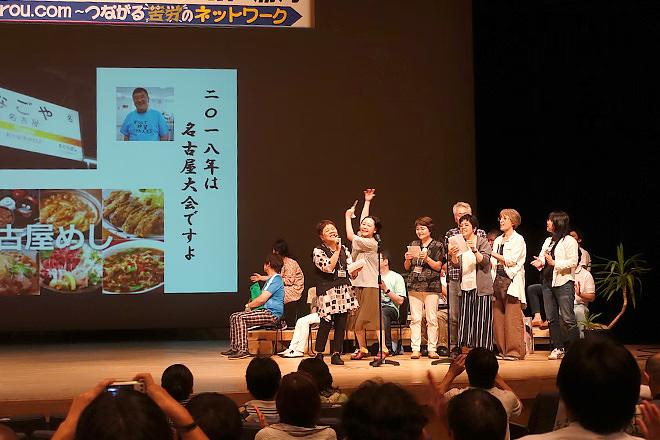
来年の当事者交流集会の開催地は名古屋。名古屋の実行委員の方たちが来年の意気込みを歌にして発表し、会は終了しました。
みんなどうやって苦労して回復するの?
〜当事者研究集会をふりかえって〜
べてるまつり前夜祭のような当事者研究集会にはじめて参加するということで、職業的にもアウェーな私は少し緊張していたのですが、発表者や参加者の熱気に徐々に巻き込まれ、最終的には自分も熱い気持ちになっていました。
特にフィンランドのおふたりが語るオープンダイアローグの話は非常にひきこまれました。日常生活での人との向きあい方や、話の聞き方としても有効だと思います。
また、リーッカさんが、あえて治療者側の職場環境の話をしてくれたのも印象に残っています。これはオープンダイアローグが、当事者と治療者の共同作業であることを示唆しているようにも感じます。
向谷地さんが『「非」援助論』のなかで以下のように語っています。
精神障害という病気が治る、癒されるということは、じつは治療者も含めてその人の生きている「場全体」の豊かさと密接に関わっている。その意味で、「場全体の回復」と言う言葉も最近浦河ではよく用いられるようになってきた。「ドクター、ナースも回復できる作業所づくり」や「地域の人たちも回復できる作業所」というキャッチフレーズは、そのようなこだわりから発せられたものである。
(浦河べてるの家『べてるの家の「非」援助論』2002年 医学書院)
「場全体の回復」とは、一方通行ではなく、複数のベクトルでおこる作用なんだと思います。そしてこれは、まさにオープンダイアローグ的なあり方だと。
患者と治療者の対立ではなく、お互いが回復しあえる関係性、その場にいる複数の人が回復できる場所…。そんな場づくりが、病院でも地域でも必要なのでないか、上の文章からも、今回のシンポジウムからも、そんな問いかけがありました。
自分の身のまわりをふりかえって、どうだろうかと考えます。わたしたちのいる場所は、「場全体の回復」ができる場になっているのかと。
オープンダイアローグの、べてるの家のたたずまいは、多くの問いを自分に投げかけています。
